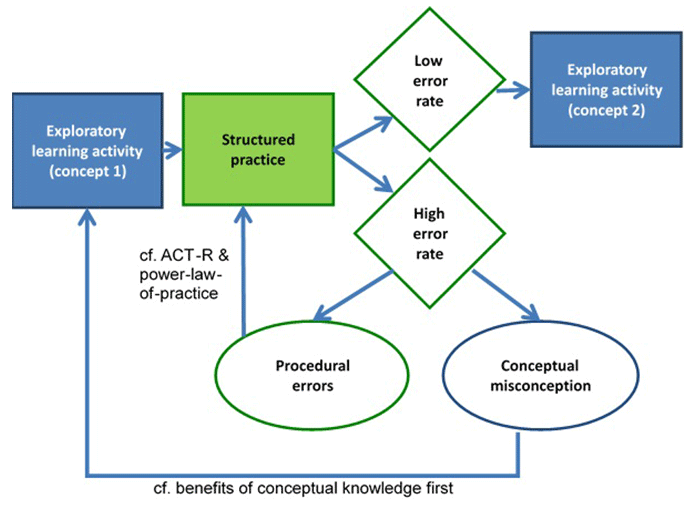Progress Update
Having presented the intervention model that underlies iTalk2Learn during a roundtable discussion at the EARLI SIG 6 & 7 meeting in Rotterdam, the RUB team received some enriching feedback.
Many experts in the fields of mathematics education and instructional design attended the roundtable discussion and were extremely positive about iTalk2Learn. To improve things even further, we are now integrating this feedback into the model itself, and so we wanted to share these developments with you!
The intervention model
One of the challenges in learning is that two very different forms of knowledge have to be acquired. For instance, in mathematics:
- On the one hand, procedures such as multiplying fractions have to be practiced until they are automatised.
- On the other hand, understanding of underlying concepts must be acquired. For example, understanding why a number gets smaller when it is multiplied by a fraction (even though previously multiplication always made a number larger), is not something that can be practiced; it simply needs to be, well, understood.
Both are important components of robust fractions knowledge (that is, knowledge that is flexible and that easily transfers to different settings). iTalk2Learn aims to foster confidence and knowledge by combining two learning activities geared towards each of the components.
- The exploratory learning environment, Fractions Lab, aims to foster conceptual knowledge
- While structured practice, with Maths-Whizz (in the UK) and Fractions Tutor (in Germany), aim to foster procedural knowledge.
Our intervention model prescribes strategies for combining these learning activities.
The following figure presents a rough overview of the intervention model. (A more detailed version can be found in D1.3.)

The learner starts out with an exploratory learning activity, which targets concept 1. After completing the activity, structured practice follows:
- When error rate is low, the learner moves on to concept 2 in the exploratory learning environment.
- When error rate is high, the type of error is taken into consideration by the iTalk2Learn platform.
- For help with procedural errors, the learner continues with structured practice.
- For help with conceptual misconceptions, the learner is placed back in the exploratory learning environment.
- For each type of error, adaptive support is given so that the error can be fixed before moving on to the next step according to the intervention model.
How will the feedback improve the intervention model?
The experts that attended the roundtable highlighted the importance of thinking about how the cognitive activities that are focused during the exploratory learning activity and the structured practice intertwine in developing students’ robust knowledge. Working in the Exploratory Learning Environment, while focusing on conceptual knowledge, may also foster procedural knowledge. Furthermore, conceptual knowledge may be strengthened during structured practice. So what does that mean for our intervention model?
We need to carefully consider when students should switch between activities and how we should sequence tasks within these activities. These are some of the important questions that the RUB team is considering, whilst revising the intervention model.
One expert suggestion was not to see the work in iTalk2Learn as a linear sequence of repeatedly learning a concept and then practicing its application. Instead, working in iTalk2learn may be like following a spiral, where you touch back to the first concept and elaborate it, thus strengthening understanding and gradually building up an interrelated network of concepts. The RUB team thinks one way to achieve this would be to include additional loops (after successful structured practice) back to the ELE, where students can check and improve their conceptual knowledge.
If you have any additional ideas for the improvements of the intervention model with iTalk2Learn, get in touch with the iTalk2Learn partners today!
In other news: Two new members have joined the RUB team!
 Julia Erdmann has recently finished her master’s degree in educational sciences at Ruhr-Universität Bochum. While completing her degree, she worked as a maths tutor for children with learning disabilities. She is intrigued by the adaptivity of the iTalk2Learn platform because she knows first-hand how neglecting students’ individual needs can easily result in boredom and frustration. Her main research interests lie in technology-enhanced-learning and collaborative learning. She is very excited to join the iTalk2Learn team. Welcome, Julia!
Julia Erdmann has recently finished her master’s degree in educational sciences at Ruhr-Universität Bochum. While completing her degree, she worked as a maths tutor for children with learning disabilities. She is intrigued by the adaptivity of the iTalk2Learn platform because she knows first-hand how neglecting students’ individual needs can easily result in boredom and frustration. Her main research interests lie in technology-enhanced-learning and collaborative learning. She is very excited to join the iTalk2Learn team. Welcome, Julia!
 Michael Wiedmann is excited to work on a tutoring platform with the potential of iTalk2Learn! After high school, he spent two years in the US tutoring and mentoring children and fractions always were a tricky subject. Michael would have loved to incorporate iTalk2Learn in his work then! In the meantime, he earned a graduate degree in Psychology and is now completing his doctorate. His dissertation focuses on measuring teachers’ competence to monitor student interaction during collaborative learning in mathematics. Welcome, Michael!
Michael Wiedmann is excited to work on a tutoring platform with the potential of iTalk2Learn! After high school, he spent two years in the US tutoring and mentoring children and fractions always were a tricky subject. Michael would have loved to incorporate iTalk2Learn in his work then! In the meantime, he earned a graduate degree in Psychology and is now completing his doctorate. His dissertation focuses on measuring teachers’ competence to monitor student interaction during collaborative learning in mathematics. Welcome, Michael!


